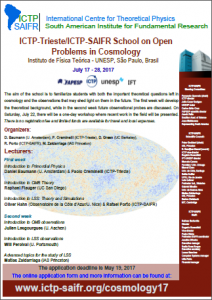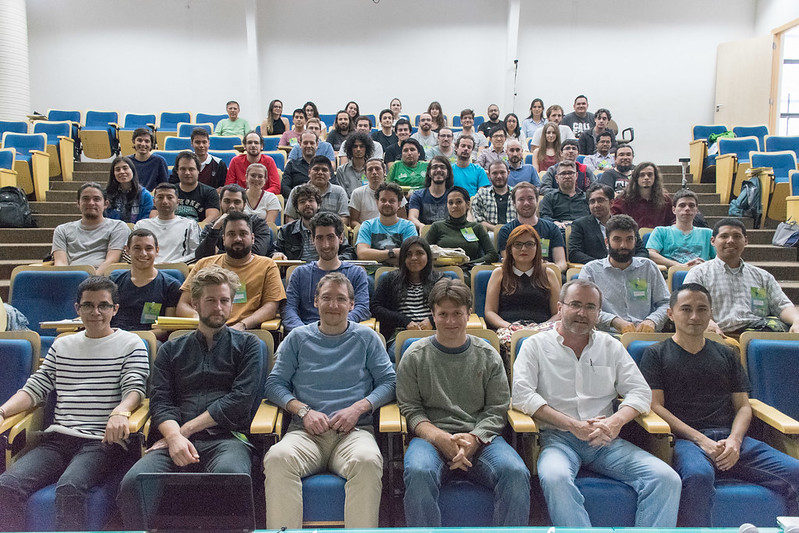ICTP-Trieste/ICTP-SAIFR School on Open Problems in Cosmology
July 17 – 28, 2017
São Paulo, Brazil
ICTP-SAIFR/IFT-UNESP
![]()
Home
The primary temperature anisotropies of the cosmic microwave background (CMB) have now been mapped by the Planck satellite to near the limits set by cosmic variance and foregrounds. As a result, the future of the field will now shift toward large-scale structure (LSS) surveys and CMB polarization. This new territory presents both a challenge and an opportunity. While data from the Sloan Digital Sky Survey and smallscale CMB experiments like ACTpol and SPTpol have been available for a few years, these experiments have yet to compete with measurements of the CMB temperature in raw sensitivity. Ultimately, new experiments must surpass existing constraints if we are going to address unresolved questions we face today in regards to the physics of the early universe. Existing data supports the framework of inflation at early times, nevertheless, we know very little about the mechanism that leads to an accelerated expansion, either in the past or in our current universe. In addition, motivations from particle physics, and from the observation of late time acceleration, suggest our cosmological history may be more intricate than previously thought. Cosmological observations may be thus our only hope to address these issues.
The aim of the school is to familiarize students with both the important theoretical questions left in cosmology and the observations that may shed light on them in the future. The first week will develop the theoretical background, while in the second week future observational probes are discussed.
On Saturday, July 22, ICTP-SAIFR will host the workshop on open problems in cosmology. Presentations will provide a review of the newest developments in both theoretical tools, forecasts and observations. The discussion will be oriented towards the problems that are most relevant for further progress.
The application for the school automatically includes participation in the one-day workshop. There is no registration fee and limited funds are available for travel and local expenses.
The School will be followed by the “IVCosmoSul – Cosmology and Gravitation in the Southern Cone“. If you would like to register for the workshop, please access http://www.ictp-saifr.org/IVCosmoSul
Organizers:
- Daniel Baumann (University of Amsterdam, The Netherlands)
- Paolo Creminelli (ICTP-Trieste, Italy)
- Daniel Green (UC Berkeley, USA)
- Rafael Porto (ICTP-SAIFR/IFT-UNESP, Brazil)
- Matias Zaldarriaga (IAS Princeton, USA)
Satisfaction survey:
- click here
Lecturers
First week:
- Paolo Creminelli (ICTP-Trieste): Introduction to Primordial Physics
- Raphael Flauger (UC San Diego, USA): Introduction to CMB Theory
- Oliver Hahn (Observatoire de la Côte d’Azur/Université de Nice, France) & Rafael Porto (ICTP-SAIFR/IFT-UNESP, Brazil): Introduction to LSS: Theory and Simulations
Second week:
- Julien Lesgourgues (Universität Aachen, Germany): Introduction to CMB observations
The goal of these lectures is to understand the latest CMB contraints from Planck 2015 (plus a small update in 2016) on a selection of cosmological parameters that are particularly relevant for theoretical cosmologists. We will try to cover:
* the parameters of the minimal LambdaCDM model and its most obvious extensions (curvature, dynamical dark energy,…)
* the sector of neutrino masses, extra relativistic relics, light sterile neutrinos, Helium fraction
* non-minimal inflation and initial conditions
* Dark Matter properties (annihilation, decay)
We will not try to get into the details of observational and instrumental aspects. This course will stay close to CMB theory, and will discuss concrete consequences of the formalism reviewed by Raphael Flauger. For each Planck bound, we will discuss the effects of the underlying parameters on the CMB spectra. We will follow a graphical approach: we will comment some plots showing not only the variation of the spectra with the parameters, but also of intermediate quantities such as the transfer functions.
These lectures will also be a primer to the use of the cosmology codes CLASS and MontePython. We will provide the python scripts used for producing the figures with CLASS, in such a way that the students can learn how to produce similar plots. Finally, we will show how to proceed in order to reproduce the Planck bounds with MontePython.
Bibliography:
- Will Percival (University of Portsmouth, USA): Introduction to LSS observations
– The linear power spectrum
– Cosmological structure growth (recap, depending on prior lectures)
– Measuring clustering
– Introduction to galaxy surveys
– Measurements of Baryon Acoustic Oscillations (e.g. http://lanl.arxiv.org/abs/
– Measurements of primordial non-Gaussiantiy
– Measurements of Redshift-Space Distortions (e.g. http://lanl.arxiv.org/abs/
– Measurements of Neutrino mass (e.g. http://lanl.arxiv.org/abs/
– Measurements of modified gravity (e.g. http://lanl.arxiv.org/abs/
– Future experiments (e.g. http://lanl.arxiv.org/abs/
– Challenges to be faced – statistics, systematics, optimisation
– Comparison to other probes (e.g. http://lanl.arxiv.org/abs/
- Matias Zaldarriaga (IAS Princeton, USA): Advanced topics for the study of LSS
Poster
School Program
PDF version (updated on July 19, 2017)
Click on the name of the Lecturers on the table below to watch the videos.
Workshop Program
PDF version (updated on July 19, 2017)
Click on the name of the Lecturers on the table below to download the pdfs and on the tile of the talks to watch the videos.
Files & Exercises
Lectures:
- Oliver Hahn (Observatoire de la Côte d’Azur/Université de Nice, France): Lecture 1, Lecture 4, Lecture 5
- Julien Lesgourgues (Universität Aachen, Germany): Lecture 1 & 2, Lecture 3, Lecture 4
- Matias Zaldarriaga (IAS Princeton, USA): Lecture 1, Lecture 2, Distinguished Public Lecture, Lecture 3, Lecture 4
- Will Percival (University of Portsmouth, USA): Lecture 1, Lecture 2, IFT-Colloquium, Lecture 4
Exercises:
WEEK 1
WEEK 2
Photos
Additional Information
List of Confirmed Participants: Updated on July 31
Registration: ALL participants should register. The registration will be on July 17 at the institute from 8:00 to 9:00 am. You can find arrival instructions at http://www.ictp-saifr.org/?page_id=195
Accommodation: Participants, whose accommodation has been provided by the institute will stay at The Universe Flat. Each participant, whose accommodation has been provided by the institute, has received the accommodation details individually by email.
BOARDING PASS: All participants, whose travel has been provided or will be reimbursed by the institute, should bring the boarding pass upon registration, and collect an envelope to send the return boarding pass to the institute.
Emergency number: 9 5293 9062 (from São Paulo city); +55 11 9 5293 9062 (from abroad), 11 9 5293 9062 (from outside São Paulo).
Ground transportation instructions:
Ground Transportation from Guarulhos airport to The Universe Flat
Ground transportation from Congonhas Airport to the Universe Flat
Ground transportation from The Universe Flat to the institute

